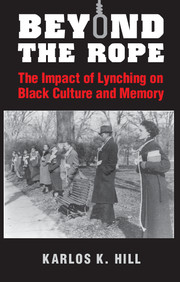4 - Remembering Lynching
Published online by Cambridge University Press: 05 July 2016
Summary
White-on-black lynchings were traumatic events for black Americans because of the pain and suffering associated with losing friends and family to terrorist violence. The remembrance of a lynching ensured that the trauma would be a recurring phenomenon. Memories of lynchings or near lynchings could be so traumatic that black Southerners sometimes chose not to talk about them. For example, in an oral history interview in 2002, Carol Mosely Braun, the first female African American U.S. senator, recalled,
There were a series of lynchings in Union Springs, Alabama … in 1911. And I know that there were lynching[s] in that town and so the family – part of the family – left and went to Chicago. And frankly, I don't know, it's funny, part of the reason why what you're [HistoryMakers] doing is so important is ‘cause a lot of that history people just didn't talk about it. Once something that kind of horrific had happened in their lives, they just didn't talk about it again.
Echoing the same sentiments, Willye B. White, a black five-time Olympian and longtime Chicago resident, remembered,
My grandfather was from Centreville-Woodville, Mississippi, and there was an occurrence there where either he was about to be lynched or he was – they were in the process of lynching him and he was able to break free. And in the process, the entire family … fled in the night, which was not uncommon for blacks … back in the apartheid days of, of, of America. So they fled. And these are things that I'm finding out now – it's something that they never talked about.
The memories of Braun and White suggest that in some cases, black people opted not to talk about lynchings because it was too difficult or painful to discuss those horrific experiences – even with other family members. But whereas some black Southerners chose not to remember lynching due to trauma, others found ways to remember lynching in spite of it, and sometimes did so by creating less traumatic versions of those memories. These memories are connected with the tradition of consoling narratives of the lynched black body. Like black writers who emphasized the heroism of black lynch victims, black Southerners who constructed alternative memories of lynching acknowledged the trauma of lynching but chose not to dwell upon it.
- Type
- Chapter
- Information
- Beyond the RopeThe Impact of Lynching on Black Culture and Memory, pp. 104 - 118Publisher: Cambridge University PressPrint publication year: 2016



